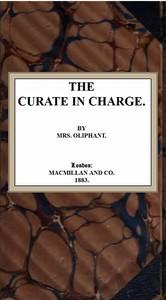|
|
Read this ebook for free! No credit card needed, absolutely nothing to pay.Words: 85021 in 21 pages
This is an ebook sharing website. You can read the uploaded ebooks for free here. No credit cards needed, nothing to pay. If you want to own a digital copy of the ebook, or want to read offline with your favorite ebook-reader, then you can choose to buy and download the ebook.

: The Curate in Charge by Oliphant Mrs Margaret - England Fiction; Clergy Fiction@FreeBooksWed 07 Jun, 2023 THE CURATE IN CHARGE THE PARISH. The parish of Brentburn lies in the very heart of the leafy county of Berks. It is curiously situated on the borders of the forest, which is rich as Arden on one side, and on the edge of a moorland country abounding in pines and heather on the other; so that in the course of a moderate walk the wayfarer can pass from leafy glades and luxuriant breadth of shadow, great wealthy oaks and beeches, and stately chestnuts such as clothe Italian hill-sides, to the columned fir-trees of a Scotch wood, all aromatic with wild fragrant odours of the moor and peat-moss. On one hand, the eye and the imagination lose themselves in soft woods where Orlando might hang his verses, and heavenly Rosalind flout her lover. On the other, knee-deep in rustling heather and prickly billows of the gorse, the spectator looks over dark undulations of pines, standing up in countless regiments, each line and rank marked against the sky, and an Ossianic breeze making wild music through them. At the corner, where these two landscapes, so strangely different, approach each other most closely, stand the church and rectory of Brentburn. The church, I am sorry to say, is new spick-and-span nineteenth century Gothic, much more painfully correct than if it had been built in the fourteenth century, as it would fain, but for its newness, make believe to be. The rectory is still less engaging than the church. It is of red brick, and the last rector, so long as he lived in it, tried hard to make his friends believe that it was of Queen Anne's time--that last distinctive age of domestic architecture; but he knew very well all the while that it was only an ugly Georgian house, built at the end of the last century. It had a carriage entrance with the ordinary round "sweep" and clump of laurels, and it was a good-sized house, and comfortable enough in a steady, ugly, respectable way. The other side, however, which looked upon a large garden older far than itself, where mossed apple-trees stood among the vegetable beds in the distant corners, and a delicious green velvet lawn, soft with immemorial turf, spread before the windows, was pleasanter than the front view. There was a large mulberry-tree in the middle of the grass, which is as a patent of nobility to any lawn; and a few other trees were scattered about--a gnarled old thorn for one, which made the whole world sweet in its season, and an apple-tree and a cherry at the further corners, which had, of course, no business to be there. The high walls were clothed with fruit trees, a green wavy lining, to their very top--or in spring rather a mystic, wonderful drapery of white and pink which dazzled all beholders. This, I am sorry to say, at the time my story begins, was more lovely than profitable; for, indeed, so large a garden would have required two gardeners to keep it in perfect order, while all it had was the chance attentions of a boy of all work. A door cut in this living wall of blossoms led straight out to the common, which was scarcely less sweet in spring; and a little way above, on a higher elevation, was the church surrounded by its graves. Beyond this, towards the south, towards the forest, the wealthy, warm English side, there were perhaps a dozen houses, an untidy shop, and the post-office called Little Brentburn, to distinguish it from the larger village, which was at some distance. The cottages were almost all old, but this hamlet was not pretty. Its central feature was a duck-pond, its ways were muddy, its appearance squalid. There was no squire in the parish to keep it in order, no benevolent rich proprietor, no wealthy clergyman; and this brings us at once to the inhabitants of the rectory, with whom we have most concern. The rector had not resided in the parish for a long time--between fifteen and twenty years. It was a college living, of the value of four hundred and fifty pounds a year, and it had been conferred upon the Rev. Reginald Chester, who was a fellow of the college, as long ago as the time I mention. Mr. Chester was a very good scholar, and a man of very refined tastes. He had lived in his rooms at Oxford, and in various choice regions of the world, specially in France and Italy, up to the age of forty, indulging all his favourite tastes, and living a very pleasant if not a very useful life. He had a little fortune of his own, and he had his fellowship, and was able to keep up congenial society, and to indulge himself in almost all the indulgences he liked. Why he should have accepted the living of Brentburn it would be hard to say; I suppose there is always an attraction, even to the most philosophical, in a few additional hundreds a year. He took it, keeping out poor Arlington, who had the next claim, and who wanted to marry, and longed for a country parish. Mr. Chester did not want to marry, and hated everything parochial; but he took the living all the same. He came to live at Brentburn in the beginning of summer, furnishing the house substantially, with Turkey carpets, and huge mountains of mahogany--for the science of furniture had scarcely been developed in those days; and for the first few months, having brought an excellent cook with him, and finding his friends in town quite willing to spend a day or two by times in the country, and being within an hour's journey of London, he got on tolerably well. But the winter was a very different matter. His friends no longer cared to come. There was good hunting to be sure, but Mr. Chester's friends in general were not hunting men, and the country was damp and rheumatic, and the society more agricultural than intellectual. Then his cook, still more important, mutinied. She had never been used to it, and her kitchen was damp, and she had no means of improving herself "in this hole," as she irreverently called the rectory of Brentburn. Heroically, in spite of this, in spite of the filthy roads, the complaints of the poor, an indifferent cook, and next to no society, Mr. Chester held out for two long years. The damp crept on him, into his very bones. He got incipient rheumatism, and he had a sharp attack of bronchitis. This was in spring, the most dangerous season when your lungs are weak; and in Mr. Chester's family there had at one time been a girl who died of consumption. He was just at the age when men are most careful of their lives, when, awaking out of the confidence of youth, they begin to realize that they are mortal, and one day or other must die. He took fright; he consulted a kind physician, who was quite ready to certify that his health required Mentone or Spitzbergen, whichever the patient wished; and then Mr. Chester advertised for a curate. The parish was so small that up to this moment he had not had any occasion for such an article. He got a most superior person, the Rev. Cecil St. John, who was very ready and happy to undertake all the duties for less than half of the stipend. Mr. Chester was a liberal man in his way. He let Mr. St. John have the rectory to live in, and the use of all his furniture, except his best Turkey carpets, which it must be allowed were too good for a curate; and then, with heart relieved, he took his way into the south and the sunshine. What a relief it was! He soon got better at Mentone, and went on to more amusing and attractive places; but as it was on account of his health that he had got rid of his parish, consistency required that he should continue to be "delicate." Nothing is more easy than to manage this when one has money enough and nothing to do. He bought a small villa near Naples, with the best possible aspect, sheltered from the east wind. He became a great authority on the antiquities of the neighbourhood, and in this way had a constant change and variety of the very best society. He took great care of himself; was never out at sunset, avoided the sirocco, and took great precautions against fever. He even began to plan a book about Pompeii. And thus the years glided by quite peacefully in the most refined of occupations, and he had almost forgotten that he ever was rector of Brentburn. Young fellows of his college recollected it from time to time, and asked querulously if he never meant to die. "You may be sure he will never die if he can help it," the Provost of that learned community replied, chuckling, for he knew his man. And meantime Mr. St. John, who was the curate in charge, settled down and made himself comfortable, and forgot that he was not there in his own right. It is natural a man should feel so who has been priest of a parish for nearly twenty years. This Mr. St. John was a man of great tranquillity of mind, and with little energy of disposition. Where he was set down there he remained, taking all that Providence sent him very dutifully, without any effort to change what might be objectionable or amend what was faulty; nobody could be more accomplished than he was in the art of "putting up with" whatsoever befell him. When once he had been established anywhere, only something from without could move him--never any impulse from within. He took what happened to him, as the birds took the crumbs he threw out to them, without question or preference. The only thing in which he ever took an initiative was in kindness. He could not bear to hurt any one's feelings, to make any one unhappy, and by dint of his submissiveness of mind he was scarcely ever unhappy himself. The poor people all loved him; he never could refuse them anything, and his reproofs were balms which broke no man's head. He was indeed, but for his sympathy, more like an object in nature--a serene, soft hillside touched by the lights and shadows of changeable skies, yet never really affected by them except for the moment--than a suffering and rejoicing human creature. "On a fair landscape some have looked And felt, as I have heard them say, As if the fleeting time had been A thing as steadfast as the scene On which they gazed themselves away." This was the effect Mr. St. John produced upon his friends and the parish; change seemed impossible to him--and that he could die, or disappear, or be anything different from what he was, was as hard to conceive as it was to realize that distinct geological moment when the hills were all in fusion, and there was not a tree in the forest. That this should be the case in respect to the curate in charge, whose position was on sufferance, and whom any accident happening to another old man in Italy, or any caprice of that old man's fancy, could sweep away out of the place as if he had never been, gave additional quaintness yet power to the universal impression. Nobody could imagine what Brentburn would be like without Mr. St. John, and he himself was of the same mind. At the period when this story commences the curate was a widower with "two families." He had been so imprudent as to marry twice; he had two daughters grown up, who were coming to him, but had not arrived, and he had two little baby boys, whose mother had recently died. But how this mother and these boys came about, to Mr. St. John's great surprise--and who the daughters were who were coming to take charge of him--I must tell before I go on any further. The whole episode of his second marriage was quite accidental in the curate's life. THE PREVIOUS HISTORY OF MR. ST. JOHN. The Reverend Cecil St. John started in life, not so much under a false impression himself, as conveying one right and left wherever he moved. With such a name it seemed certain that he must be a man of good family, well-connected to the highest level of good connections; but he was not. I cannot tell how this happened, or where he got his name. When he was questioned about his family he declared himself to have no relations at all. He was his father's only child, and his father had been some one else's only child; and the result was that he had nobody belonging to him. The people at Weston-on-Weir, which was his first curacy, had a tradition that his grandfather had been disowned and disinherited by his family on account of a romantic marriage; but this, I fear, was pure fable invented by some parish authority with a lively imagination. All the years he spent at Weston nobody, except an old pupil, ever asked for him; he possessed no family possessions, not even an old seal, or bit of china. His father had been a curate before him, and was dead and gone, leaving no ties in the world to his only boy. This had happened so long ago that Mr. St. John had long ceased to be sad about it before he came to Weston, and though the ladies there were very sorry for his loneliness, I am not sure that it occurred to himself to be sorry. He was used to it. He had stayed in Oxford for some years after he took his degree, working with pupils; so that he was about five and thirty when he took his first curacy, moved, I suppose, by some sense of the monotony of an unprogressive life. At five and thirty one has ceased to feel certain that everything must go well with one, and probably it occurred to him that the Church would bring repose and quiet, which he loved, and possibly some quiet promotion. Therefore he accepted the curacy of Weston-on-Weir, and got lodgings in Mrs. Joyce's, and settled there. The parish was somewhat excited about his coming, and many people at first entertained the notion that his proper title was Honourable and Reverend. But, alas! that turned out, as I have said, a delusion. Still, without the honourable, such a name as that of Cecil St. John was enough to flutter a parish, and did so. Even the sight of him did not dissipate the charm, for he was handsome, very tall, slight, serious, and interesting. "Like a young widower," some of the ladies thought; others, more romantic, felt that he must have a history, must have sustained a blight; but if he had, he never said anything about it, and settled down to his duties in a calm matter-of-fact sort of way, as if his name had been John Smith. AUNT JANE. THE St. Johns had one relative, and only one, so far as they knew. This was Miss Jane Maydew, who lived in London, the aunt of their mother, a lady who possessed in her own right--but, alas, only in the form of an annuity--the magnificent income of two hundred and fifty pounds a year. To think that this old lady, with only herself to think of, should have fifty pounds more yearly than a clergyman with a family, and all the parish looking to him! More than once this idea had crossed even Hester's mind, though she was very reasonable and could make her pounds go further than most people. Miss Maydew was not very much older than her niece, but yet she was an old lady, sixty-five, or thereabouts. She liked her little comforts as well as most people, yet she had laid by fifty pounds of her income for the last twenty years, with the utmost regularity. A thousand pounds is a pretty little sum of money, but it does not seem much to account for twenty years of savings. A stockbroker might make it easily in a morning by a mere transfer from one hand to another; and to think how much wear and tear of humanity can be in it on the other hand! It is discouraging to poor economists to feel how little they can do, labour as they may; but I don't think Miss Maydew had anything of this feeling. She was on the contrary very proud of her thousand pounds. It was her own creation, she had made it out of nothing; and the name of it, a thousand pounds! was as a strain of music in her ears, like the name of a favourite child. Perhaps it was the completion of this beautiful sum, rounded and finished like a poem, which gave her something of that satisfaction and wish for repose which follows the completion of every great work; and this brought about her visit to Brentburn, and all that directly and indirectly followed it. She had not seen the St. Johns since Hester's death, though they were her nearest relatives, the natural heirs of the fortune she had accumulated. And the summer was warming into June, and everything spoke of the country. Miss Maydew lived in Great Coram Street, Russell Square. She had two charming large rooms, her bedroom at the back, her sitting-room at the front, the two drawing-rooms in better days of the comfortable Bloomsbury mansion. But even when your rooms are airy and cool, it is hard to fight against that sense of summer which drops into a London street in the warm long days, waking recollections of all kinds, making eyelids drowsy, and the imagination work. Even the cries in the street, the "flowers a blowing and a growing" of the costermongers, the first vegetables, the "groundsel for your birds," and the very sight of the greengrocer opposite with his groves of young cabbages and baskets of young potatoes awoke this sensation of summer in the heart of the solitary woman at her window. Her youth, which was so full of summer, stirred in her once more, and old scenes all framed in waving foliage of trees and soft enclosures of greensward, came before her closed eyes as she dozed through the long long sunny afternoon. A frugal old maiden, lodging in two rooms in a noisy Bloomsbury street, and saving fifty pounds a year, is as little safe as any poet from such visitations. As she sat there musing in that strange confusion of mind which makes one wonder sometimes whether the things one recollects ever were, or were merely a dream, Hester and Hester's children came into Miss Maydew's mind. She had not seen them since her niece's death, and what might have become of the poor children left with that incapable father? This thought simmered in her fancy for a whole week, then suddenly one morning when it was finer than ever, and the very canaries sang wildly in their cages, and the costermongers' cries lost all their hoarseness in the golden air, she took the decided step of going off to the railway and taking a ticket for Brentburn. It was not very far, an hour's journey only, and there was no need to take any luggage with her, as she could return the same night; so the excursion was both cheap and easy, as mild an extravagance as heart could desire. Free books android app tbrJar TBR JAR Read Free books online gutenberg More posts by @FreeBooks
: Notes and Queries Number 137 June 12 1852 A Medium of Inter-communication for Literary Men Artists Antiquaries Genealogists etc. by Various - Questions and answers Periodicals Notes and Queries@FreeBooksWed 07 Jun, 2023

: Notes and Queries Number 136 June 5 1852 A Medium of Inter-communication for Literary Men Artists Antiquaries Genealogists etc. by Various - Questions and answers Periodicals Notes and Queries@FreeBooksWed 07 Jun, 2023
|
Terms of Use Stock Market News! © gutenberg.org.in2025 All Rights reserved.






